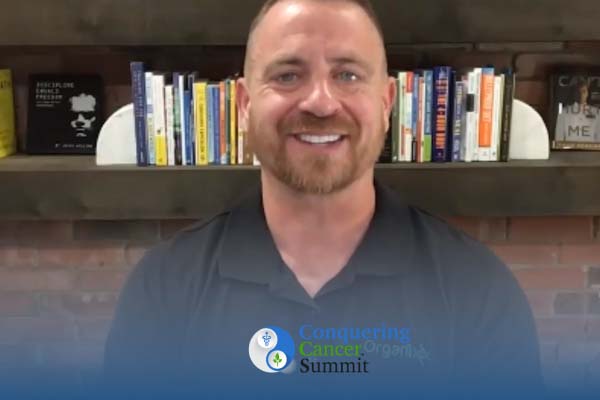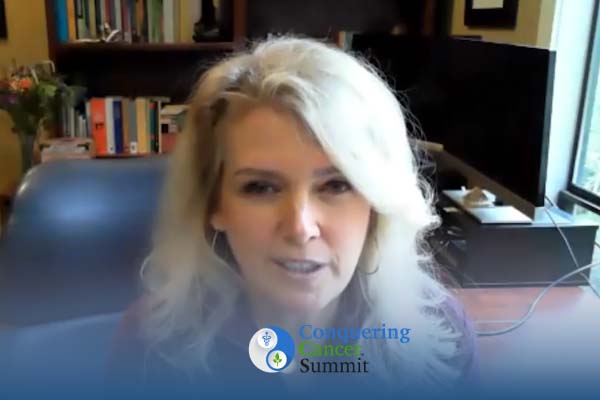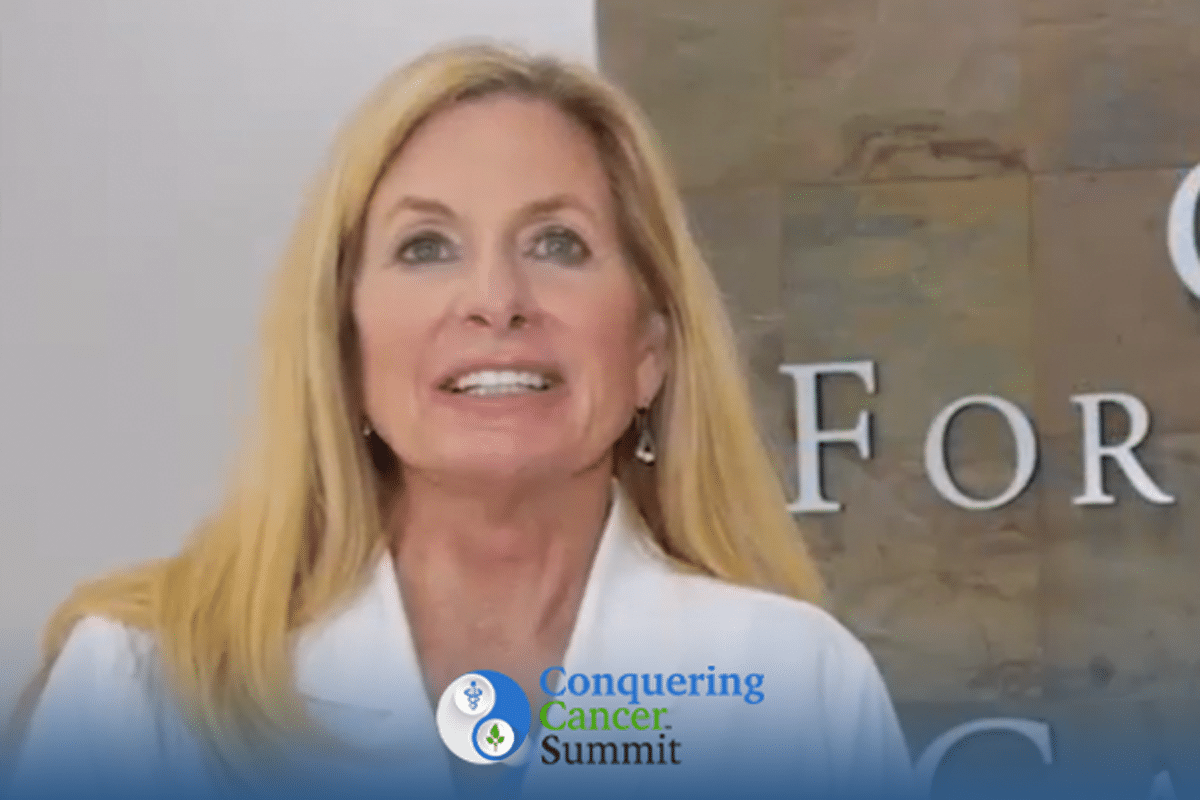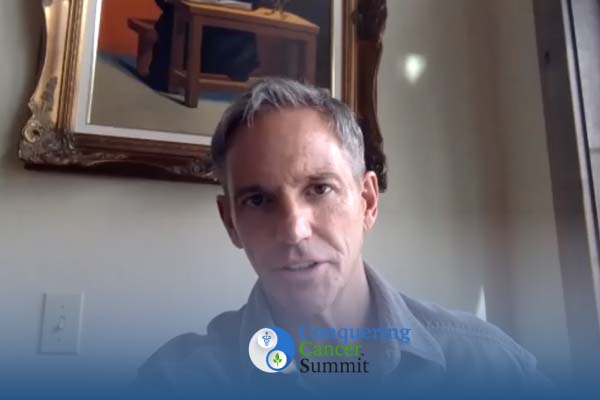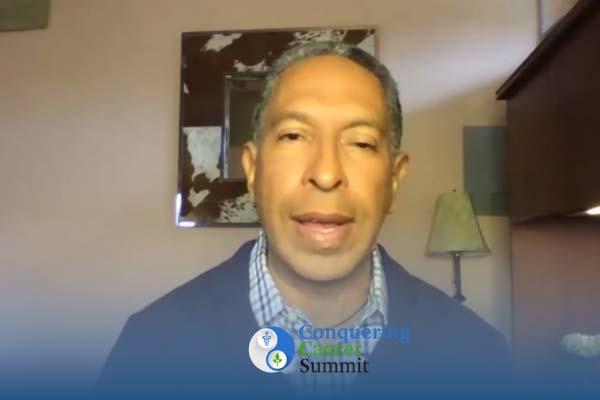Join the discussion below
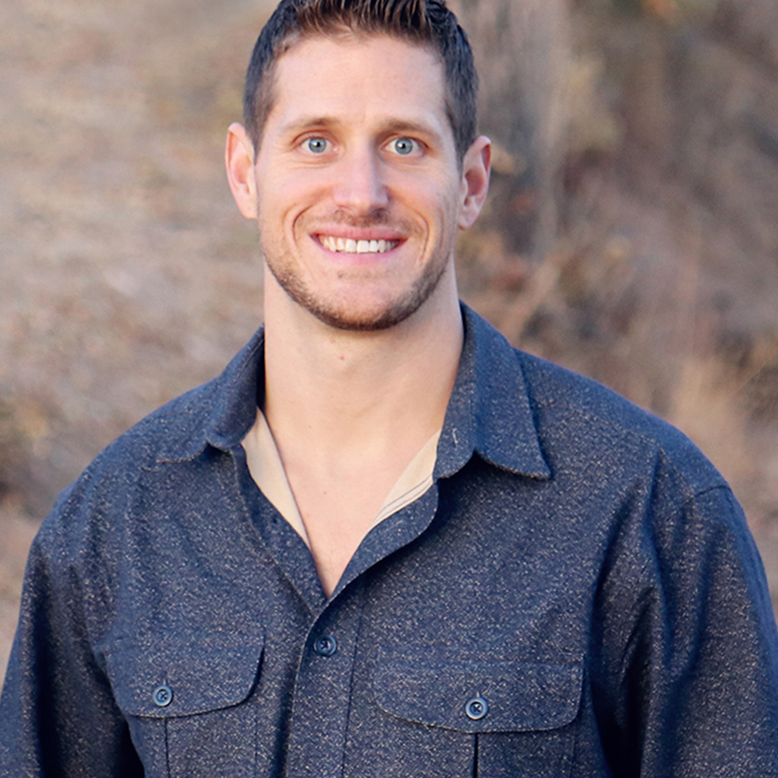
Nathan Crane is an award-winning author, inspirational speaker, plant-based athlete, event producer and 18x award-winning documentary filmmaker. Nathan is the Founder of The Panacea Community, Creator of the Global Cancer Symposium, and Director and Producer of the documentary film, Cancer; The Integrative Perspective. He is also the Director of Strategic... Read More

Jonathan is the founder of Organixx, an industry-leading supplement company that delivers the highest quality, cleanest organic supplements available. Jonathan started this company because of the huge demand for quality supplements at affordable prices. For the past 14 years, he has been a leading frontrunner in the digital marketing space.... Read More
Nathan Crane
Hey it’s Nathan Crane, Director of the Health and Healing Club and host of the Conquering Cancer Summit. And today I am honored and excited to welcome you to a very special interview. Jonathan is the founder of Organixx, an industry leading supplement company that delivers the highest quality, cleanest organic supplements available. Johnathan started this company because of the huge demand for quality supplements at affordable prices. In addition to being the founder of Organixx, Jonathan is the co-founder and the executive producer of the mega hit Truth About Cancer docu-series. He just completed his first marathon in the summer of 2019 and has lost over 90 pounds in the last few years after committing to a healthier overall lifestyle which includes his own organic supplements. He’s a health enthusiast who is passionate about fitness and committed to delivering supplements that can really make a powerful difference in the health and lives of others. Jonathan brother, thank you so much for joining us man.
Jonathan Hunsaker
Absolutely, thanks for having me.
Nathan Crane
Yeah. So I’d love to start with a little bit about your own experience with health, your own journey. Obviously, you were significantly overweight and had some health challenges of your own. But you were also involved in the Truth About Cancer docu-series from the very beginning, right? So how did being involved in that help you transform your own health to the obviously healthier version of yourself that you are today?
Jonathan Hunsaker
Absolutely. It seems like everything just came together at one time. So it was beginning of early 2014, I was 270 pounds, smoking a pack and a half of cigarettes a day and had been for 20 years. And was probably drinking six or seven nights out of the week. I was living down in Central America, down in Panama. I say living, but I think I was more living like I wanted to die. And so, right when I got involved in that project, found out probably within a week that my girlfriend at the time was pregnant with our oldest daughter. And so, when all of those things come together there’s a sign from somewhere telling you it’s time to make a shift in your life.
And so, that’s what I did in 2014. It took a couple of months and some effort. But quit smoking, quit the drinking, changed the diet and just started that entire path of getting healthy and changing my life. To the point to where, just a few years later I went and took a lot of different athletic tests and it showed that my biological age was in my early thirties. Even though I’m 42 years old right now, ran the marathon. The amazing damage you can do to your body over so many years can be reversed and you can make changes in just a short amount of time. And that’s what I did and and continued to try to live a healthy lifestyle now.
Nathan Crane
Yeah, you obviously look healthy. And you’ve obviously made some massive changes. I mean, 90 pounds, that’s almost an entire human being that you’ve lost off of your body. Which is significant to reducing your own cancer risk, to increasing your own longevity. To obviously, having an impetus. Like a deeper reason or meaning for our own health, our own lifestyle change such as the upcoming birth of a child, right? I know I have two children myself and I know that when my children were born, it’s like they just give you more meaning, more purpose, more passion to take better care of yourself.
But at the same time, we’re talking to, mostly, people who are 50 and older in many cases. Who have cancer or other chronic challenges or trying to prevent cancer, right? And they’re also looking for that impetus. And I think oftentimes it’s, doesn’t have to be something so drastic as the birth of a new child. It can just be a deeper reason for wanting to live. And so, is there anything else for you that, obviously in addition to your own child, that has just helped pull you forward to do sometimes the challenging things that you have to do to make those changes so that you can lose that weight, you can get healthier, you can run a marathon, quit drinking, quit smoking, all these kinds of things?
Jonathan Hunsaker
I mean, I don’t think there’s just any one thing, right? I think there’s gotta be that desire to live. And I think there’s multiple things around that, right. So, being involved with the Truth About Cancer and I know your audience, I mean, we talk about 15 above. Is it that grandchild that’s coming, right? That you need to find that reason to live. Is it to be around longer for your kids? Is it just so you don’t huff and puff getting up off of the couch, right? Is it so that you can go walk, so that you can move your body? I mean, I think there’s a lot of things and it’s never just one thing, right? It’s not like every morning I woke up thinking, daughter coming, gotta go train, right? There’re many days that the training didn’t happen, there’re many days that the eating healthy did not happen. And a lot of times, and especially when I run now.
I mean, I ask myself why am I doing this? And the number one answer every time is for me, right. And then the number two answers to set a good example for my daughters. And I do that every day when I go out for a run or every time I go running. So, I think first and foremost, it’s gotta be for you. And if that can’t be reason enough, then find that other reason. Whether that’s a child, whether that’s a pet, whether that’s a spouse, whether that’s just to see what the world looks like in 20 years. Right?
Nathan Crane
Yeah. That’s a great point. I mean, if you have the desire within yourself to feel better, live longer, have a better quality of life. That alone is strong enough to pull you through the hard times, from the terror, through dark times, right? I know in my own life, very similar, addiction and chronic illness and all kinds of challenges and grew up on vaccines and antibiotics and was sick all the time. And it took really wanting to know what it’s like to live healthy and strong and vital for me to change my life, right.
And so I think that’s a really good key that you just shared. Is find that passion, that desire within yourself that can pull you forward to the better version, the healthier version of yourself. And that could just be less pain, more energy, more clarity, whatever it could be so you feel better. We all wanna feel good, right? We all wanna be happy, we all wanna be healthy, we all wanna feel good. And so, that’s led you obviously into starting this supplement company, Organixx. Which you’ve had mega success with, right? And obviously, as someone who owns a supplement company you get to see firsthand into what really happens behind the scenes with supplements. So, maybe you can share with us, over your years, what are some of the most shocking things you’ve discovered with many of the supplements today that maybe most people just don’t know about?
Jonathan Hunsaker
Absolutely. And before I do that, just wanna clarify. I’m not a doctor, I’m not a scientist, I’m not an academic. I would say I’m a researcher now, but that’s just out of the demand. I was an entrepreneur when I was 17, door to door salesman at 14. I’ve just been good at solving problems, I guess. And finding people who were good at helping me solve problems. And so, with the journey with the Truth About Cancer, we had a lot of people that were looking for good quality supplements. And as we went down that rabbit hole, right. I didn’t know then this is where I would be, this is just where life has taken me.
We started going down that rabbit hole and realizing there weren’t a whole lot of good quality supplements out there. There’s more now than they were back in 2016 when we started the company. But yeah, there wasn’t a whole lot to recommend. And so, that’s why we started kind of the supplement company. And what I discovered along the way, this isn’t, by the way, a pitch to come buy my products, this is just to help you find the right products for yourself and know that you’re getting supplements that are actually gonna make a difference in your life. Because the reality is 98, if not 99% of the stuff out there on the store shelves, on the internet is just junk. Most of the money is spent on marketing, over-hype, citing all of these different research papers and all of these different studies that were done. But they’re not applicable to that supplement that’s using those studies.
So you ask, what are some of the biggest things that were surprising for me? I think the biggest thing to really understand, and a lot of your audience may already know this, is there’s a big difference between a whole food supplement and a synthetic supplement. Most of your one a days out there, your Centrum Silvers, all the other one a days that are being sold on the store shelves out there are synthetic. And so, the vitamins, the minerals they’re actually being extracted from things like oil and tar and oil byproducts, right. So they have all of this by-product from drilling oil and they needed to do something with it. So they can extract these different vitamins and minerals out of it and then they put it together into a vitamin that they sell to us so that they can use more of the waste to sell back to us. Right, so you talk about carcinogens and things out there that can cause cancer and that’s one of them, right. You’re looking to get healthy and so you’re starting to take these supplements, only to find out that it’s a garbage supplement. It’s synthetic, your body doesn’t even recognize it, right. Yes. Maybe molecularly it might look the same, right.
So, ascorbic acid we’ll take as an example, vitamin C. Number one, you can make ascorbic acid in the lab, right. That makes it synthetic. Molecularly it might look the same as your ascorbic acid from an orange, right? You can say, hey, look these are the same. A couple of things that are not the same here. Number one, most of that ascorbic acid is being made in labs in China. I think last I looked it was 95% of all of the lab made ascorbic acid, which is the vitamin C you’re buying, is made in China.
So we know that the regulation is there, We know that the quality there is of question. Two, it’s not a whole food supplement. So you get more from a whole food vitamin C from acerola cherries or camu camu than you will from a lab made ascorbic acid. Why? Well, there’s all kinds of things. Whether that’s the different enzymes, different ingredients inside of that plant that make that ascorbic acid. The vitamin C bioavailable. It makes it so your body can actually recognize it as a food and knows how to use that ascorbic acid in the healthiest ways. So, the big misconception is that synthetic is the same as whole food. No, it’s just cheaper, garbage and made in a lab. Whole food supplementation is by far what you need to look for, that it’s made from whole foods. I can go down the rabbit hole of the difference of whole food supplements if you like right now or we can kinda stop there and figure out the next question?
Nathan Crane
Yeah. Maybe we can go there next. I just was reminded, I was at an event a while back and it was kind of like an event with leaders in the natural health field. And there was a woman there, I won’t mention her name, I don’t wanna cause any problems for her. But very, very, very well known. If I mention her name, you would know who she is. Millions and millions of followers. Has been in kind of the natural health space for a long time, many years. And she has her own supplement company, right? And she had her supplements there. She just had her bars and powders and supplements and all kinds of things that she was just giving away to everybody at this kind of private event.
And I was there and I was like, Oh yeah, check out her. She’s probably got some great products, right? And so I went and looked and I started looking. First thing I do is always read the ingredients of anything before I ever consider putting it in mine or my family’s bodies. Which I think is a first step for everyone, right? Always read every ingredient. I don’t look at the front of the label. I mean, I do, I look for certain keywords but I don’t depend on the front of the label. Always read the back of the label, right. So I’m reading the ingredients and I’m like, are you serious? It’s filled with sugar, all kinds of processed junk, it had preservatives, it had all kinds of crap in it that I would never put in my body.
So I put that down, I grabbed the next product. I’m like, okay, hopefully this one’s better. Look at this one, same thing. Look at this one, same thing. And I’m just like, here’s this well-respected health person, millions of people trust her, buying her health products. And to me they’re garbage, they’re junk. I would never put ’em in my body, right. And that’s kind of something I think that really goes to what you said. It’s like there’s so much garbage and junk out there and just because there’s a so-called respected health professional promoting it does not mean that it is good for you.
Jonathan Hunsaker
Listen, there’s a lot of doctors for hire. I can go out there and pay a doctor and have them represent and say whatever I want ’em to say about my supplement unfortunately. And that happens in this space a lot. And it’s unfortunate because as a consumer you don’t know who to trust and who not to trust. And this is where actually understanding the core values of the company can matter. Take a little time in doing some research and figuring out what are some of the things that they stand for, what’s some of their history? Not just looking at the shiny thing that they’re marketing or that they’re trying to sell you. And that’s just one of the challenges. Another thing that you can look at too is, I wanted to share kind of the difference between different whole food quality supplements.
One way, in my opinion, that you can tell I wanted to say the quality of the company but their integrity in using quality ingredients is if they use organic or not. I think that’s a big deal. I think having food that has not been sprayed with pesticides and herbicides and insecticides is important. Right. I mean, we know these things are carcinogens, we know that they cause cancer. And so, if a company is willing to go out of the way to not use that cheaper alternative I feel a little bit better about that company. And I think that they’re really trying to create a quality product. And so, that is true when it comes to supplements, right. I’m telling you right now, it is way more expensive for me to make a supplement with an organic turmeric or with organic mushrooms or with organic, fill in the blank. It’s probably four to five times the price.
But the difference is, if I’m taking a supplement that’s already a high concentration of a certain nutrient or plant, botanical, whatever it is, right. Then I wanna make sure that I’m not getting high concentrations of pesticides, herbicides, insecticides, right? We all know about Glyphosate and RoundUp, right? You don’t want that on your supplements. So you have a whole food supplement, That’s better than synthetic. Whole food organic is gonna be even better than just a whole food supplement. And so that’s something to really take into consideration. And it kinda comes back full circle in knowing the company, knowing who the creators are. Is it worth it for them to go the extra mile to deliver an organic product? Because I think the quality definitely makes a difference.
There’s people that can argue the nutrient density between organic and non-organic. There is no argument that pesticides, insecticides and herbicides are good for you, right? Versus having them outside of the diet, right, is not good for you. So, argue all you want, all day long about the nutrient density between organic and not organic. But you can never argue with me that one has a poison and one does not, and which one is healthier.
Nathan Crane
Yeah, it’s a good point. I mean, as I said, when we’re shopping we always look at the front of the label first and always read the ingredients. I mean, things we’re looking for on the front of the label is organic. And I know that a lot of people say, “well, I can’t afford organic or does it really matter “because organic still allows some kind of synthetic types “of insecticides and different things on it?” And the reality is, one, even though you might pay a little bit more for organic for the long term of your health. The safety of your life and your health, you have to ask yourself, is it worth it? Is my life, my health, my quality of life worth it. And anybody who’s sick or has been sick, the answer is always yes, right? The thing is, hopefully we don’t have to wait until we get sick to answer that, but is it worth it? And it’s really not. At the end of the day for the consumer, it’s not that much more expensive, right? It’s maybe a $20 or $30 more for a particular supplement. But what you’re getting out of that is significantly more beneficial to your body. Right?
Jonathan Hunsaker
Absolutely. And I think there’s several ways that you can look at it, right? Number one, yes organic is more expensive. To me that’s why we try to buy organic as much as possible when you can afford it because that demand will drive the price down. Which is what we all need and what we know is gonna be healthier. Now, it’s the same thing, right? You may not be able to always eat organic. So does that mean never eat organic? Of course not, right? You may not go to the gym seven days a week, Does that mean not going to the gym once or twice a week then, if I can’t go seven days a week or all the time then I’m never gonna go? That’s of course not the attitude to have.
It’s the same thing with organic. You may not always be able to afford the organic products but when you can, you should, and you should get them. Even if that’s just one meal a week, right. Or one meal a day. It also is the same when it comes to supplementation. For instance, I think you’re better off taking an expensive organic multivitamin every other day than taking a synthetic or a whole food one every single day. So if your synthetic to your whole food is at $30 for a month supply, then the organic version is $60 for a month’s supply I think you’re better taking a half dose a day of the organic or every other day, then you’re taking of the synthetic or the regular whole food with pesticides every single day. Right, you’re gonna get more out of the organic one on a every other day basis than you will on the other ones on a daily.
Now they’re the same price, right? Now this one month supply of organic multivitamin will last you two months. The same as your Centrum Silver or your other whole food multivitamin. And I think when you start recognizing that difference then it puts things into perspective. Yes, there’s some fortunate people out there that can afford to take it daily. If you’re not one of them, maybe you take it once every three days. But heck, start taking something and make sure it’s worth taking. ‘Cause if you buy synthetic, you might as well put it in the toilet and just flush, right. You’re absolutely getting nothing. But if you’re also, especially if they’re watching this summit, you’re looking at preventing cancer or treating cancer. You don’t wanna put things in your body that are more carcinogenic, like a whole food supplement that you don’t know is clean. I think you’re better off not eating it, quite frankly or not taking it if it’s not organic.
Nathan Crane
Or just buying an organic banana for 20 cents more, right?
Jonathan Hunsaker
Agreed, agreed a hundred percent.
Nathan Crane
Absolutely. So what are– Go ahead.
Jonathan Hunsaker
That’s another thing I just wanna touch on when you say that. Supplements are just that, they’re there to supplement the diet, right? So, it doesn’t mean I get to eat McDonald’s every day and I just take a good organic multivitamin and I’m great, right. No, it’s about having good life choices. Unfortunately, our soil now is so depleted of nutrients and minerals from all the over farming that even organically grown fruits and vegetables don’t have the nutrient density that they did 30 years, 40 years, 50 years ago. So supplementation becomes necessary. It’s not there to allow you to just eat whatever you want and eat junk. It’s there to supplement your diet for what you’re not able to get through the whole foods that you’re eating.
Nathan Crane
Yeah. I’m glad you mentioned that. ‘Cause you’ve got to have your foundation. Your food, your diet should be your foundation. And when you cook at home, like we do 80, 90% of the time and we do shop 90 to 99% organic, it’s way cheaper to cook at home and make organic meals with fresh plant-based foods, right? Your vegetables, your fruits, your quinoa, all these things that they’re actually a lot cheaper when you’re cooking them at home. And they go a lot longer and that should be the foundation. But then the supplementation, that’s why we supplement, right? Is to add that additional nutritional profile that we may not be getting from our food, into our bodies just to help us benefit greater from it. So, what are some of the other things that people need to be aware of when considering supplements?
Jonathan Hunsaker
I think one of the other things to look at is the way research data is manipulated in order to make claims. Think of an example here. So ashwagandha, right. Ashwagandha, it’s a great herb. It’s great for stress, great for recovery, things like that. It’s an adaptogen. There’s a lot of studies out there on how good ashwagandha is. The challenge is, for these studies they’re usually using a high quality probably even organic ashwagandha. And so, there’s these studies that show how good ashwagandha is for you but then you have this company over here that sources it from China and is getting it for a couple dollars a kilo. And it is garbage.
It’s grown in soil that has no nutrients anyway, right. It’s mass produced. And then they’re using these research studies that make all these claims for ashwagandha but then they sell you an ashwagandha that doesn’t have near the nutrient makeup that was used in the study. So, the thing to understand here is, yes ashwagandha is amazing, but what’s the quality of the ashwagandha in that supplement that you’re using. An example is, there’s a patented ashwagandha organic, called KSM-66. There’s all sorts of studies behind using that ashwagandha. That when you know if you’re buying that kind of ashwagandha you’re getting the results, you’re getting the same quality that was used in that study.
This is why I think it goes back kinda to the organic conversation, things like that. Just buying organic, it’s likely gonna be a much higher quality ingredient to begin with. You’re not always gonna know. Not everybody’s always going to use a patented ingredient or different things like that. But just understand that, I think in life in most things and supplements are no different, you get what you pay for. So if there’s a bottle of ashwagandha and it’s on Amazon and it’s selling for 17.99. That sounds phenomenal. There’s another bottle of ashwagandha that’s 39.99. You’re likely getting three times the quality ashwagandha out of that $39 supplement. This isn’t me sitting here trying to sell you to buy more expensive supplements. I just want you to understand that it’s not apples to apples. You can’t just scroll Amazon and look for the best price and think that you’re getting the same ingredient. Because it may not be organic, it may not be as dense, it could be straight outta China for dirt cheap. My point is, you gotta do a little bit of research. You gotta figure out the company that you’re buying from.
It’s worth it to shoot their customer support email and say, hey, where does this ingredient come from, where do you get your ashwagandha from, where are these things come from? If they don’t wanna answer you, don’t buy from ’em, right? Because, somebody that’s proud of what they create is not gonna have any issue sharing. Hey, this is where we get it from, here’s what it is, let me tell you more information about it, here’s the purchase orders and the quality tests.” It’s another thing too. And again, this isn’t a pitch for us but we run all of ours through third-party testing for heavy metals, pesticides, insecticides, all kinds of third-party tests for cleanliness. Ask these companies are you third-party testing your product, right.
Can you show me the results of that? I wanna see how much heavy metals in it, how many pesticides are in it? Do you test for glyphosate, right? We spend money and we test specifically for glyphosate. ‘Cause listen, I’m just trusting the person I’m buying the ingredient from, right. That it’s what they say it is and what they put on the label. But I’m ingesting all of these things too. So I wanna have these tested before I put ’em in my body. Why wouldn’t another supplement creator do the same thing and then share those results with their audience. So, it’s not as easy. I know we all love the quick fix. Let me just hurry and buy and click it. And it’ll be here tomorrow with Amazon Prime and all that fun of getting it overnight. Consider that it’s worth it to take a little bit of time and do a little bit more research. Otherwise you’re just gonna throw your money away. You’re not gonna get the results you’re looking for.
Nathan Crane
Yeah. I love that you just shared that. I think it’s super important. I think it’s worth saying as well that, and this isn’t any kind of dosage advice or anything like that. But when you are sick, typically, an herbalist might prescribe you more therapeutic doses or an integrative doctor or a nature pathic doctor will say, look, here’s maintenance dosages. Which is about what most people are getting today in supplements, right? And here’s therapeutic doses. This is what your body actually needs to have a fighting chance for itself to heal. And when you’re looking at supplements, I have this green food supplement right now and then I bought another green food supplement. So I’m trying ’em, I’m trying new things all the time.
And looking at all the different factors that you’re talking about, right? The, is it organic, where is it sourced, the quality of the ingredients, all these different things. These two different packages. I just wanna share this story ‘because I think it’s really important. They both have the exact same quantity, right? They both have whatever it was, 600 grams or whatever the amount is. 600 might be a lot, I dunno. You know. Whatever the amount is. But then you look at the servings. This one had 12 servings and this one had 30 servings, right. And so, and then you look at the serving size and you look at the quantity of the ingredients in that serving and you recognize why this one is significantly more expensive, and this one is way cheaper. Is, the one that was a lot more expensive and has much less servings. Well, they’re making sure your body is actually getting a higher therapeutic dose.
They’re making sure they’re saying, look, if you just take this tiny dose over here you may get some benefit but realistically you’re not getting a lot of benefit. But you think you’re getting all this benefit because, oh, I got this for $25. It’s super cheap, I got 30 servings. Oh, this one’s way more expensive. There’s only 10 servings, 12 servings. But you’re getting 30 grams per serving instead of five grams over here. So the end result of what you’re getting is significantly more nutrition in your body. And actually, when I did the price comparison for how many grams of the ingredients you’re getting in your body compared to this one, this one’s actually cheaper. But you don’t see that on the front end ’cause all you see on the front end is the price, right? Oh, a whole food green supplement, $20. Whole food green supplement, $75. What the heck, okay, I’m gonna buy the $20 one. So anyway, I think it’s worth saying, looking at how much of the quantity of the ingredients you’re actually getting into your body as well is pretty important.
Jonathan Hunsaker
Yeah. There’s so many different things that go into it and you’re a hundred percent right. And what’s interesting is I wanted to talk kind of about the price, ’cause you spoke about price and just looking through there. Some of the dirty secrets I’ve learned being in this space, right. Is we make a product called Turmeric 3D. And I was pricing. I was looking for manufacturers and I was shopping around. Who could help us save a little bit of money on this. And most manufacturers came back and said if you don’t use organic, if you don’t ferment, which I’ll talk about fermentation in a second. If you don’t ferment it, if you don’t add these other things like the ginger and the KSM-66 ashwagandha, I can make that for you for $2 and 50 cents bottled. And that means I could sell it on Amazon for 39.95 all day long and make 10 to 12 times my return on that investment.
Unfortunately, I don’t have the luxury of those kinds of numbers, ’cause I’m just not gonna sell crap. But our Turmeric 3D cost us over $10 a bottle to make and bottle up. And I sell it for 49.95. Yes, it’s about four to five times markup. The difference being is, if I were to sell it at 10 times markup, it’d be a hundred plus dollar supplement. But you are getting something that is literally three or four or five times better than that cheaper one. So it might be a little bit cheaper because nobody’s ever gonna buy it at a hundred plus. I also don’t need 10 times markup to survive as a business, right? I only need enough so we can stay in business next month and stay in business year.
I don’t need to make so much that we’re all driving Lambos and destroying the planet even more. But I say all that to say, you pay a little bit more, you’re probably getting a lot more in the long run. And I think it’s like that a lot of times in life with everything, this isn’t just supplements. This is in general. Save a little bit of money, be smart, buy the one that’s a little bit nicer. It’s gonna last longer, it’s gonna be healthier for you. You’re just gonna get what you pay for. And right now with so many things made out of China and other places, we all wanna look for that cheap price. We’re all on a budget, I get it. I’m just telling you it’s gonna pay off tremendously with your health if you don’t skimp on that kind of stuff.
Nathan Crane
Beautiful. So if you were to sum it up in three or five key points, people should really be watching out for when they’re buying supplements, what would those key points be?
Jonathan Hunsaker
Never take synthetic supplements ever. I don’t think they’re ever gonna do any benefit for you. Save your money, spend it on something else. So definitely take a whole food supplement. And if you can, have it be whole food organic. Whole food organic ingredient Just a little side note, okay. The capsules, in order for something to be USDA certified organic it has to be more than 95% organic. The capsules themselves, while their vegetable caps are not certified organic, and they make up 7% of the product.
So ours is 93% organic on most of our products but they can’t carry the USDA seal because the capsule itself makes up 7%. So it’s not just, let me look and see, is it a USDA certified or not or does it say made with organic? Turn around and read the label and check every single ingredient. Does it say organic turmeric, does it say organic mushrooms, organic ashwagandha. Make sure it lists organic for every single one of those ingredients. Some ingredients out there you can’t get organic. They just don’t certify ’em yet, but you should check and make sure that as much of the ingredients in that product are organic. So that’s the number one thing to look for. The second thing is, don’t believe the hype, right. A lot of these companies making these 10 and 12 X returns have ridiculous amount of money to spend on marketing. If it seems too good to be true, it probably is. Do a little bit of research.
Find out where are they sourcing their ingredients, find out who it is that’s behind that company. Do they have integrity, do they not? What’s their history, what’s their story? There are really good supplement companies out there. I know a lot of the owners of most of them. There’s good ones out there and do the research and go find them. The third thing, the third thing. Supplements are just supplements, right. They’re not going to… They don’t fill the void of a non clean diet, a non clean lifestyle, right. So get out and move your body, right. Get outside of your house and breathe fresh air. Number one, best thing you can do for your health all day long and twice on Sunday. Move your body, getting big, deep, fresh breaths. The second thing is, what are you feeding your body? Are you giving it good whole foods, less processed foods, organic whenever possible. If you eat meat, then are you getting meat that is not factory farmed?
That it’s pasture-raised, it’s grass fed, it’s free range, things like that. So, supplements are good and supplements can really help your health. And, like you talked about between a maintenance dose and a therapeutic dose. There’s some people out there that would do really good at taking a whole lot of enzymes, right. And especially loading up that body and really getting that storage built back up again. But it’s gonna be short-lived if you’re not doing the other stuff. If you’re not moving your body, if you’re not eating right. If you’re not good in a mental, mentally well. Meaning, you’re not in front of your screen all day, you’re not watching TV all day. You’re actually reading a book. You’re stimulating yourself in one way or another, you’re still learning. So, this is a whole holistic approach. You’re not gonna go out and spend $60 on any bottle that I sell, start taking two a day. And in a month all of a sudden be magically better in all ways, shapes and forms. You’ve got to make this a whole integrative approach across every area of your life.
Nathan Crane
Beautiful, yeah. That was a really good summation and I’m glad you keep coming back to that foundation. ‘Cause that’s critical. I can say that yours is one of the companies that I feel is doing all of these things that you talked about, right. Which is why I use your supplements myself because I look for all these things myself. And I get contacted by supplement companies and skincare companies and all kinds of companies all day long wanting me to use their products and try ’em and sell ’em and all that. And most of ’em, I can tell you I turned down and say no to. If I don’t use it myself I will not share it with anybody else. And yours is one of the products that I do use myself.
So, thank you for really staying committed to quality, to effectiveness, to organic, to making sure that good quality ingredients are getting out to the world. Even if it means reducing profit margin but still, as you said, being able to stay in business so you can keep helping people. Thank you for doing that for being committed to that. We need more people like yourself out there doing it. So, thanks so much, Jonathan. I appreciate your time and appreciate you for all the good work that you do. And thanks for being here to share with our audience.
Jonathan Hunsaker
Absolutely. Thanks for having me. Thank you for what you do. I mean, when I first started kind of my journey to health it was all about the anti-cancer movement, right. And ridding this from our world and being healthy and healing and all of that. And so, you’ve been doing this way before I even got in to this space. And so, I wanna thank you for your continued commitment year after year after year and doing these summits. These summits, what you’re doing, is the best way to get the most up-to-date information, right.
I know I was executive producer of the documentaries. And those are all great, but they become outdated a year or two later. And so, with you doing summits where you’re bringing back all the experts every year, it’s the only way to get the most up-to-date information. And I love it. I love that you’re doing it, I love your message. I love… Yeah man, get a little emotional about it. I love what you stand for. And so, I’m really happy that you asked me to be in the series, so I appreciate that.
Nathan Crane
Absolutely brother, my honor. I really appreciate that. Again, thank you so much. And I wanna thank everyone for tuning into the Conquering Cancer Summit. Please share this with friends and family. Together we truly can make a difference for the future of humanity in ending the cancer pandemic. Thank you, and I wish you ultimate health and happiness. Be well.
Downloads

